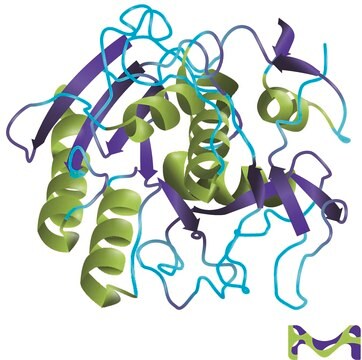추천 제품
일반 설명
Purified Proteinase K DNA free SAE0151 undergoes strict quality control testing to ensure the absence of detectable levels of contaminating DNA using 35 cycles PCR amplification of 16S and 18S rDNA using universal primer sets.
Proteinase K is a stable serine protease with broad substrate specificity. It degrades many proteins in the native state even in the presence of detergents. Proteinase K was isolated from a fungus able to grow on keratin and the enzyme can digest native keratin. The enzyme belongs to the subtilisin family with an active site catalytic triad (Asp39 -His69 -Ser224).
The predominant site of cleavage is the peptide bond adjacent to the carboxyl group of aliphatic and aromatic amino acids with blocked alpha amino groups. It is commonly used for its broad specificity. Proteinase K is usually denatured by subsequent phenol extractions.
The study of microbial communities has been revolutionized in recent years by the widespread adoption of culture independent analytical techniques such as 16S rRNA gene sequencing and metagenomics. Since DNA contamination during sample preparation is a major problem of these sequence-based approaches, DNA extraction reagents free of DNA contaminates are essential.
Proteinase K is a stable serine protease with broad substrate specificity. It degrades many proteins in the native state even in the presence of detergents. Proteinase K was isolated from a fungus able to grow on keratin and the enzyme can digest native keratin. The enzyme belongs to the subtilisin family with an active site catalytic triad (Asp39 -His69 -Ser224).
The predominant site of cleavage is the peptide bond adjacent to the carboxyl group of aliphatic and aromatic amino acids with blocked alpha amino groups. It is commonly used for its broad specificity. Proteinase K is usually denatured by subsequent phenol extractions.
The study of microbial communities has been revolutionized in recent years by the widespread adoption of culture independent analytical techniques such as 16S rRNA gene sequencing and metagenomics. Since DNA contamination during sample preparation is a major problem of these sequence-based approaches, DNA extraction reagents free of DNA contaminates are essential.
애플리케이션
- Proteinase K is frequently used in molecular biology applications to digest unwanted proteins, such as nucleases from DNA or RNA preparations from microorganisms, cultured cells, and plants.
- Removes endotoxins that bind to cationic proteins such as lysozyme and ribonuclease A useful for the isolation of hepatic, yeast, and mung bean mitochondria.
- Determination of enzyme localization on membranes
- Treatment of paraffin embedded tissue sections to expose antigen binding sites for antibody labeling.
- Digestion of proteins from brain tissue samples for prions in Transmissible Spongiform Encephalopathies (TSE) research.
Useful for the proteolytic inactivation of nucleases during the isolation of DNA and RNA.
Removes endotoxins that bind to cationic proteins such as lysozyme and ribonuclease A.
Reported useful for the isolation of hepatic, yeast, and mung bean mitochondria
Determination of enzyme localization on membranes
Treatment of paraffin embedded tissue sections to expose antigen binding sites for antibody labeling.
Digestion of proteins from brain tissue samples for prions in Transmissible Spongiform Encephalopathies (TSE) research.
Removes endotoxins that bind to cationic proteins such as lysozyme and ribonuclease A.
Reported useful for the isolation of hepatic, yeast, and mung bean mitochondria
Determination of enzyme localization on membranes
Treatment of paraffin embedded tissue sections to expose antigen binding sites for antibody labeling.
Digestion of proteins from brain tissue samples for prions in Transmissible Spongiform Encephalopathies (TSE) research.
생화학적/생리학적 작용
Proteinase K is a stable and highly reactive serine protease. Evidence from crystal and molecular structure studies indicates the enzyme belongs to the subtilisin family with an active-site catalytic triad (Asp39-His69-Ser224). It is stable in a broad range of environments: pH, buffer salts, detergents (SDS), and temperature. In the presence of 0.1-0.5% SDS, proteinase K retains activity and will digest a variety of proteins and nucleases in DNA preparations without compromising the integrity of the isolated DNA.
특징 및 장점
Purified Proteinase K DNA free SAE0151 undergoes strict quality control testing to ensure it will be free of DNA contaminants, suitable for Microbiome research.
단위 정의
One unit will hydrolyze urea denatured hemoglobin to produce color equivalent to 1.0 micromole of tyrosine per minute at pH 7.5, 37°C (color per Folin-Ciocalteu reagent).
제조 메모
Proteinase K is active in 1% Triton X-100 and in 0.5% (w/v) SDS. SDS and urea will denature protein substrates resulting in increased digestion rates. Proteinase K itself is denatured much more slowly by these agents.
신호어
Danger
유해 및 위험 성명서
Hazard Classifications
Eye Irrit. 2 - Resp. Sens. 1 - Skin Irrit. 2 - STOT SE 3
표적 기관
Respiratory system
Storage Class Code
11 - Combustible Solids
WGK
WGK 1
Flash Point (°F)
Not applicable
Flash Point (°C)
Not applicable
시험 성적서(COA)
제품의 로트/배치 번호를 입력하여 시험 성적서(COA)을 검색하십시오. 로트 및 배치 번호는 제품 라벨에 있는 ‘로트’ 또는 ‘배치’라는 용어 뒤에서 찾을 수 있습니다.
자사의 과학자팀은 생명 과학, 재료 과학, 화학 합성, 크로마토그래피, 분석 및 기타 많은 영역을 포함한 모든 과학 분야에 경험이 있습니다..
고객지원팀으로 연락바랍니다.





